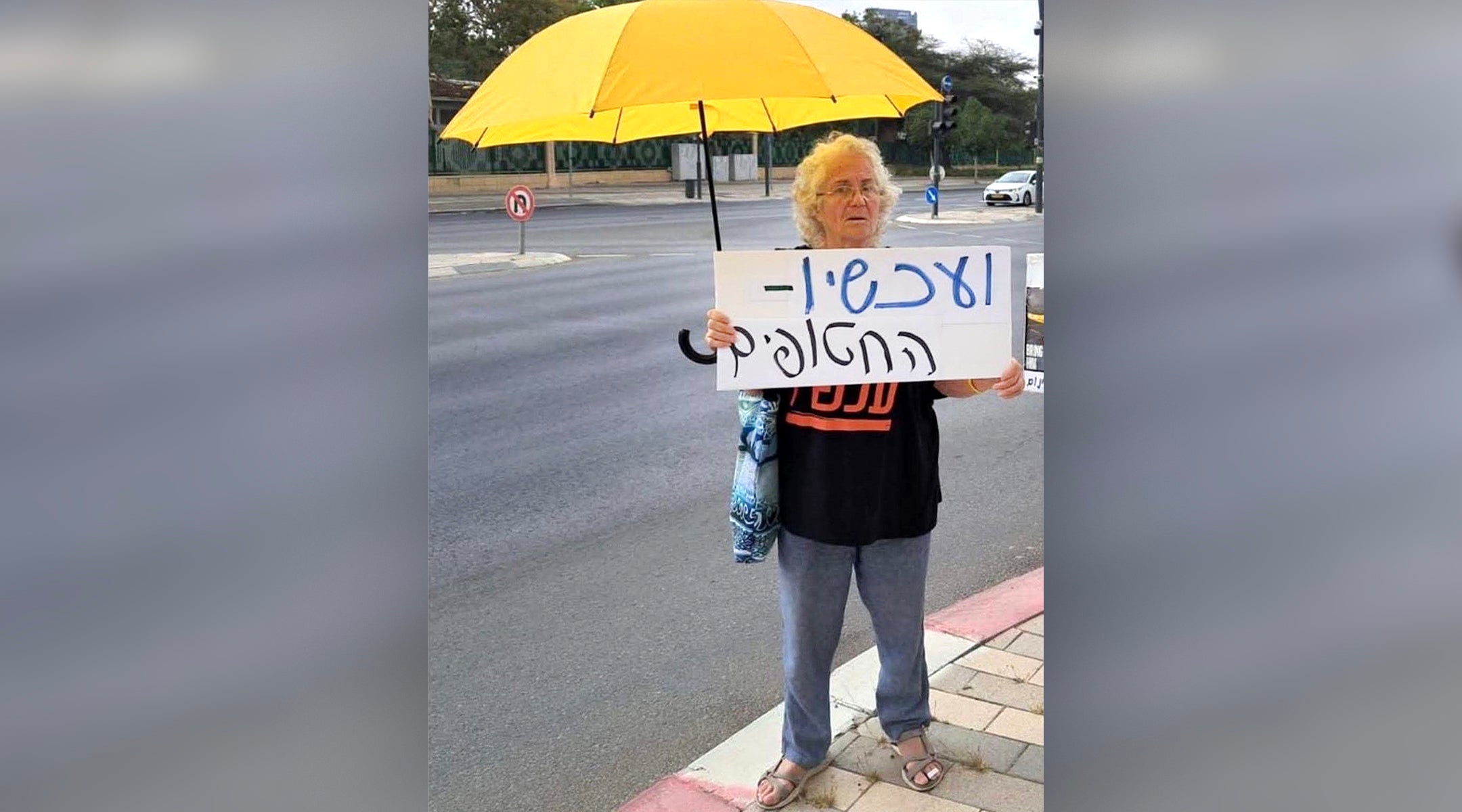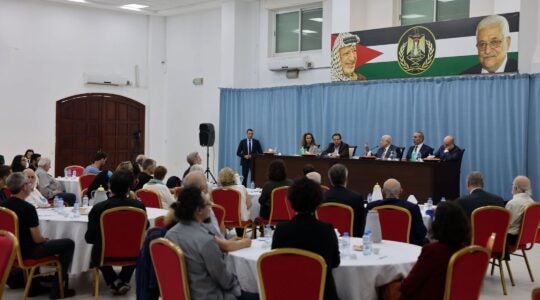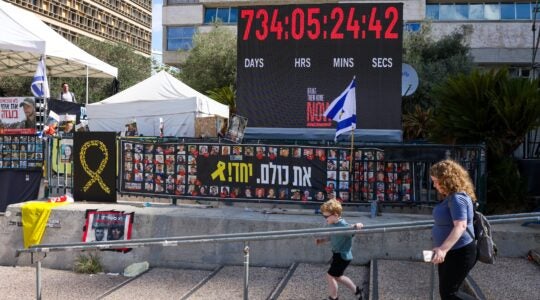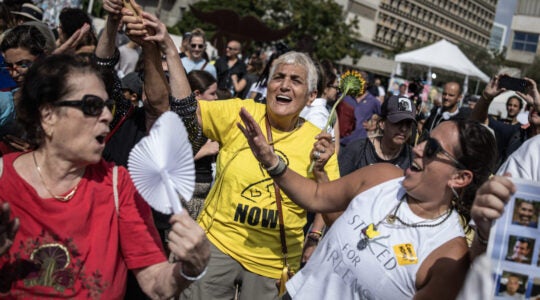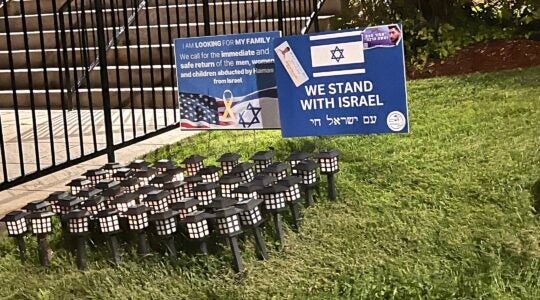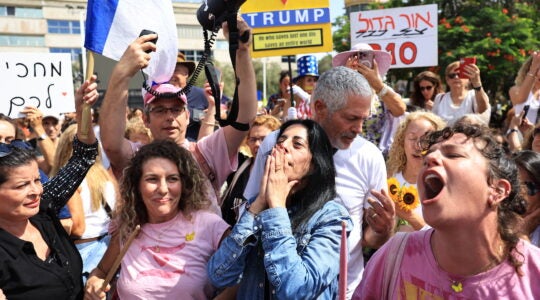JERUSALEM — Hours before she became one of the final victims of the 12-day Israel-Iran war on Tuesday, Naomi Shaanan was engaged in an activity that had made her famous in her city: She stood on the side of the road to demonstrate on behalf of the Israeli hostages in Gaza.
In a photograph that circulated widely after she was killed when an Iranian missile struck her apartment building in Beersheba, Shaanan stood alone while clutching an umbrella against the winter rain and holding a sign in Hebrew that read, “And now — the hostages.”
It was a message that channeled anxiety on the part of many Israelis — including family members of the 50 remaining hostages — that an explosion of hostilities with Iran was distracting from what some believe should be their country’s singular mission.
“With all the attention now on Iran, the … hostages have disappeared from the conversation,” Ofri Bibas-Levy, sister of freed hostage Yarden Bibas, whose wife Shiri and sons Ariel and Kfir were murdered in captivity, told a Zoom meeting held Saturday night in place of the public rallies held weekly to call for the hostages’ return.
“They’re still there, while people move on to the next front. It’s important for the public to know the hostages could be home now, we are one political decision away,” Bibas-Levy said at the virtual rally, organized by the Hostages and Missing Families Forum. “Just as there was a brave decision to strike in Iran, and just as leaders showed courage to bring closure in Lebanon — now we are just one decision away from bringing them all home.”
She added that such a decision “will bring our brave soldiers home” and “allow us to shift focus and resources to Iran.
Bibas-Levy was far from alone in articulating such a view as Israel struck Iran. Ruby Chen, whose son Itay, a dual American-Israeli citizen and IDF soldier who was abducted by Hamas on Oct. 7 and later confirmed killed, slammed Israeli officials for “taking credit” for military victories against Iran while “forgetting that the previous war did not end.”
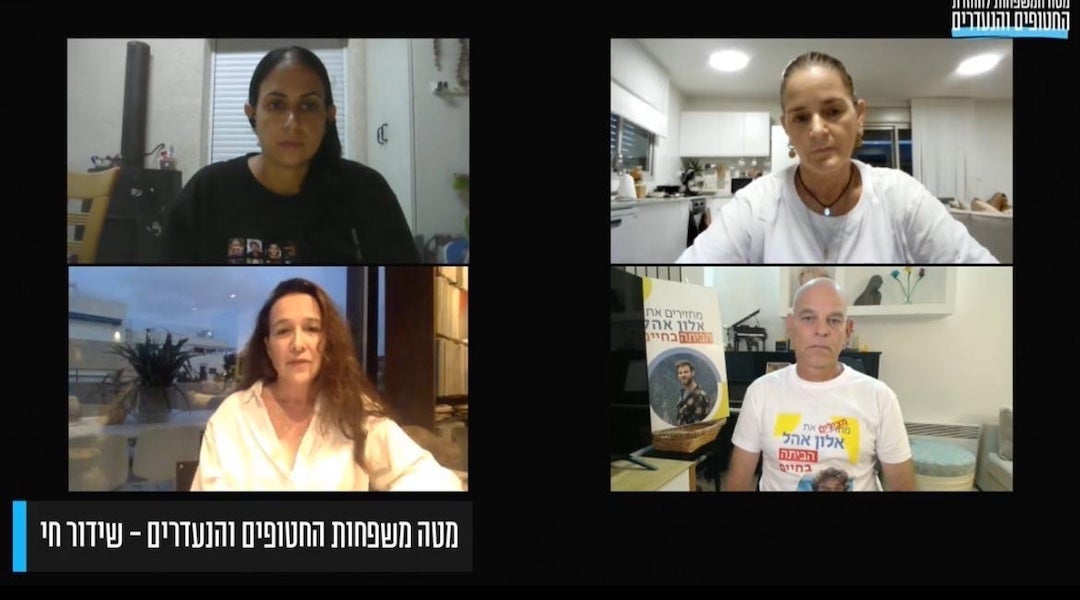
Families of hostages and their supporters met on Zoom when weekly public rallies, organized by the Hostages and Missing Families Forum, were put on hold during hostilities between Israel and Iran, June 22, 2025. (Courtesy)
In a phone interview with the Jewish Telegraphic Agency on Sunday, Chen noted that Hamas was no longer “viewed by the IDF as an imminent strategic threat,” and said that the government still bore “responsibility to the hostages and their families, as well as to the soldiers killed in recent fighting, including eight over the past 10 days.”
The Iran strikes, he continued, should mark a turning point in efforts to break the hostage deadlock. “As a father, and as a U.S. citizen, I believe that there is that opportunity for tying the two together,” he said.
“President Trump needs to put on the table a deal that ends all of this,” he added.
That did not happen. While Trump has said he believes the Gaza war should end and was instrumental in brokering a ceasefire during which dozens of hostages were freed earlier this year, the ceasefire he pressed Israel and Iran to strike on Tuesday after 12 days did not address Gaza, where Israeli soldiers are still dying and armed terror groups are still holding 50 hostages, of whom 20 are thought to remain alive.
The Hostages and Missing Families Forum is now pressing the American president to turn the Iran ceasefire into action on behalf of the hostages, whose freedom Trump has charged two officials with negotiating.
“The families of the hostages thank President Trump for his steadfast and uncompromising support for Israel,” the forum said in a statement on Wednesday, a day after it dispatched a delegation, including freed hostages, to distribute photos of the remaining hostages to lawmakers in Congress. “He has achieved this historic ceasefire with Iran — we ask him to seize this window of opportunity to make the deal of all deals: bring all 50 of our loved ones home and end the war in Gaza.”
Insiders had been divided on whether they thought the war with Iran would have a salutary effect on the plight of the hostages.
Hagit Chen, Ruby’s wife and Itay’s mother, told the Hebrew-language Walla news outlet last week that she believed the war with Iran was not only eclipsing the hostages’ plight but actively pushing any deal to free them further out of reach.
“We are no longer counting 621 days to the war to return the kidnapped, but six days to the war to overthrow Iran,” she said, adding that the return of her son Itay and the other hostages now felt “farther away than ever.”
Others said they believed Israel’s offensive against Iran would make a hostage deal more likely.
“I think it’ll increase the chances dramatically. I hope so at least,” the Israeli journalist Yaakov Katz told the Jewish Telegraphic Agency 48 hours into the war. “A weakened Iran means a further isolated Hamas and a more constrained Hamas and a Hamas that understands that it has to be more open to ending the war, because it now has lost its patron. It has lost its support and provisions, and therefore it could meet a fate of where it’s also completely eliminated. So it might have more of an interest now in a deal.”
Israeli Prime Minister Benjamin Netanyahu addressed the concerns of the hostage families during a speech Tuesday night declaring victory in the Iran war.
“To the families of the hostages, I say: We have not ceased for a moment, even a single one, including during this war, from our efforts to return home all of our hostages,” he said. “Again: Both the living and the deceased. And we will not relent from this sacred mission until it is complete.”
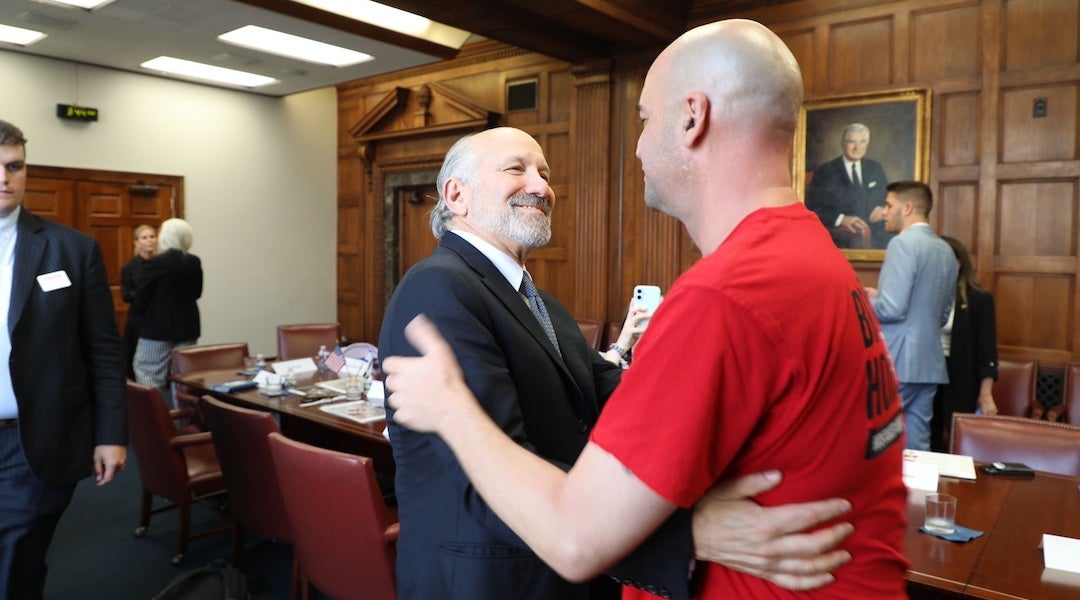
Former hostage Iair Horn. right, meets with U.S. Commerce Secretary Howard Lutnick at the White House in Washington, D.C., June 24, 2025. Horn was part of a delegation meeting with lawmakers and White House officials to focus attention on the plight of hostages in Gaza. (White House photo)
The message was cold comfort for the majority of Israelis who say the war in Gaza should already have been brought to a close to secure the freedom of the hostages. Many of them fought to keep the hostages’ plight in the national and international consciousness as the Iran war grabbed headlines and sent
Rachel Goldberg-Polin and Jon Polin, whose son Hersh was murdered in captivity and TK, posted a picture from their safe room, holding a sign saying in Hebrew, “Our hostages have no safe room.”
Captivity survivor Naama Levy, who turned 21 on Sunday and spent her previous birthday in captivity, released a video message to mark the occasion and warn against pushing the hostages out of public consciousness. “I ask you, even now, with the war against Iran and all of us preoccupied with so many other things, do not forget the hostages,” she said. “Keep fighting so that everyone can return, just as you fought for me.”
People like Shaanan took to the streets despite the dangers and the prohibition on large gatherings. And the weekly mass protest turned into a 2,000-attendee virtual rally channeling widespread fears that the war was distracting from the hostages.
Silvia Cunio, the mother of kidnapped brothers David and Ariel Cunio, also lamented the drop in public interest over the hostages’ plight, telling Walla that she had been contacted “maybe a fifth as often” over the course of the week compared to previous ones.
“It’s very difficult to see the war with Iran dominating the headlines while the hostages are pushed to the bottom of the agenda,” she said. Cunio questioned whether the government was still actively working on their release, adding, “I’d like to think so — and I hope so.”
She called on Israeli leaders to “stop the war — both with Iran and with Hamas — and bring the hostages back.”
Carmit Palty Katzir, sister of the late Elad Katzir, said during the Saturday night rally that the “hostages are just one agreement away from here. We must break free from this sentiment that diverts attention from Gaza to Iran. This war must end with an agreement that brings all our loved ones home.”
Nira Sharabi, whose husband Yossi was kidnapped from Kibbutz Be’eri and later murdered in captivity, said the war with Iran had retriggered the trauma of Oct. 7. “I’m reliving the fears of the sirens and constantly searching for the sense of safety that’s supposed to protect us,” she said at the Zoom rally.
Macabit Mayer, aunt to hostage twins Gali and Ziv Berman and sister to Talia Berman, criticized the flood of official statements from the IDF and the prime minister on the achievements in Iran while ignoring the fate of those still held in Gaza.
“These days we seem to live in a simulated reality — a heroic and apparently necessary war, with many successes,” she said. “I’m waiting to hear a sentence, a word, a letter about the 53 souls,” she said, including in her tally three hostages whose bodies had just been returned. “Enough of this torture. End the fighting in Gaza from a position of strength and power.”
Now, with Israel claiming victory over Iran, Israeli life is returning to normal — but with the searing losses of the latest war reshaping reality. Shaanan reportedly asked for no funeral. Instead, her allies are calling for her death to be transformed into an engine of liberation of the hostages..
“May her memory be a blessing,” a protest group posted on social media late Tuesday, alongside half a dozen pictures of Shaanan at hostage rallies. “May their return be her legacy.”
JTA has documented Jewish history in real-time for over a century. Keep our journalism strong by joining us in supporting independent, award-winning reporting.
